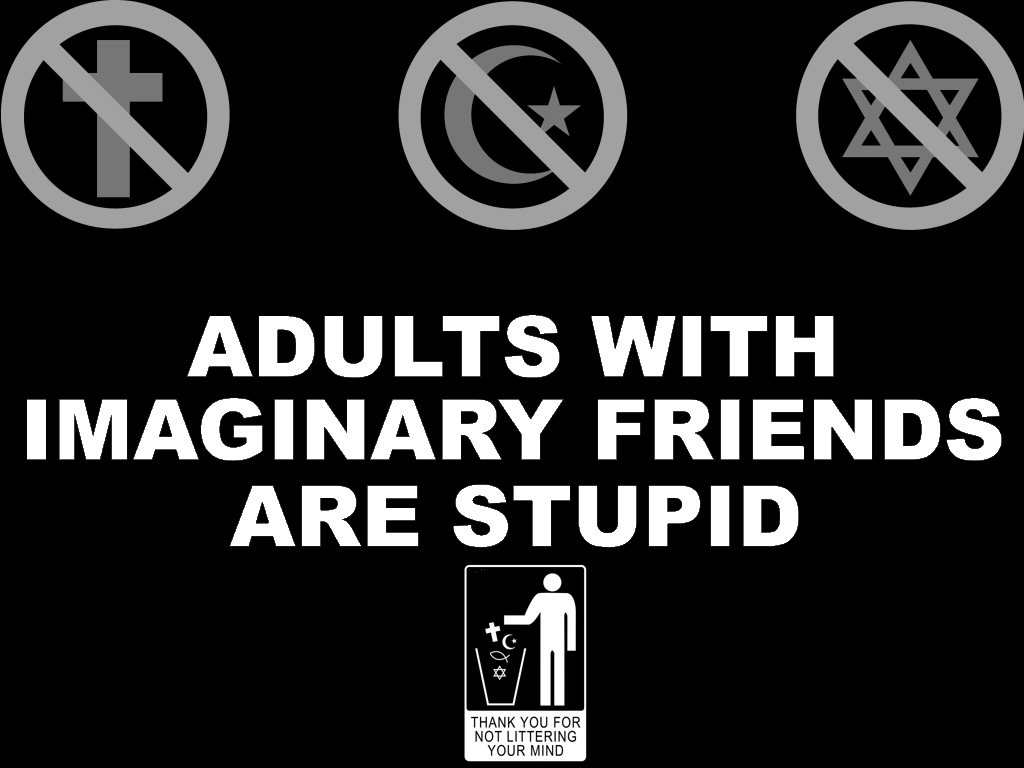
Many religious theists insist that irreligious atheists who criticize religion, religious beliefs, and theism are being intolerant and disrespectful. What are these irreligious atheists doing — are they calling for religion to be banned? For religious believers to be put in jail? No, nothing of the sort. All of this alleged intolerance and disrespect occurs because irreligious atheists disagree with religious theism, say it is wrong, argue that it's harmful, and want people to change.
For most religious theists, their religion and their belief in god are very important to them — even constituting the very center and focus of their lives. Given just how important religion and theism are to people, it's not surprising that people will react to criticism negatively and become defensive.
That, however, doesn't justify labeling disagreement and criticism as "intolerant."The reasons people have for being atheists may be as numerous as atheists themselves, but in the West at least the irreligious atheists who are critical of religion tend to share a number of perspectives and attitudes — including with regards to religion. It would be fair to say that a significant majority regard religion and theism as wrong, irrational, unfounded, and at times silly or even dangerous (though to varying degrees).
They believe that religion and theism have been forces for violence, bigotry, and many other harms in society throughout human history. Their criticisms of religion are designed to explain what the problems are, why they are problems, and convince people to change by giving up religion and theism in exchange for secular, godless, atheistic philosophies.
Atheistic disagreement with religion and theism can range from mild to vociferous — even the same atheist may disagree with some religions much more strongly than others. None of this, however, is the same as "intolerance." Saying that someone is wrong is not intolerance. Telling a person that they have adopted a belief which is irrational, ill-founded, or even dangerous is not intolerance — even if the criticisms happen to be mistaken or stated too strongly.
Even mocking, ridiculing, and making fun of beliefs isn't intolerance. Some beliefs, claims, ideas, and opinions really are quite silly and deserve mockery. Sometimes, the absurdity of and idea is better demonstrated through mockery than through a reasoned, logical analysis. Sometimes, beliefs shouldn't be treated with the seriousness of a logical analysis because that imparts to them a respectability they don't deserve. Political humor and political cartoons are an entire genre of criticism that is founded upon just these principles and which, to my knowledge, no one has argued should be eliminated.
In fact, politics is an excellent example of how disagreement and criticism are not normally treated as forms of intolerance. If it's legitimate to use ridicule and mockery to point out problems in a political leader, institution, or ideology, why should it suddenly be illegitimate to do the same in the context of religion, religious leaders, religious institutions, and religious beliefs? Liberals aren't told that they shouldn't say conservatives are wrong. Conservatives aren't told that they shouldn't say liberals have adopted irrational beliefs. Democrats aren't told that they shouldn't say a Republican policy is ill-founded. Republicans aren't told that they are intolerant for making strong criticisms of Democrats.
It's true that politics and political attacks can get out of control, but if you look closely you'll find that "out of control" is a label applied most often when people engage in personal attacks, advocate violence, demonize opponents, or behave in other very extreme ways. Strong disagreements, harsh critiques, pointed criticism, and even irreverent mockery of political beliefs, ideas, principles, positions, and opinions are accepted as completely justified. Why? Because once a person places their political beliefs in the public arena, they have to expect all manner of criticism and cannot demand that others treat those beliefs as if they were special. There's no good reason to think that the standards and rules for dealing with religious beliefs should be any different.
Irreligious atheists should be fair in whatever criticisms they level against religion and theism. If ever they are shown to have made an error, they should accept this and retract any criticisms based on that error. Irreligious atheists should also strive to treat religious believers themselves with basic respect, dignity, and consideration — no matter how wrong they may be, being wrong doesn't mean that someone should be treated badly as a person. It's possible for "hating the sin" to become "hating the sinner" if a person is not careful, so while being critical of religion and religious beliefs is entirely justified, it's something that can go wrong if one isn't careful.




1 comment:
Hi Larian - I know this post may have been made a few years back but it's probably more relevant than ever these days. I confess to having plagiarised a few lines from it - it's well written and concise - all the things I'm not !
All the best from Glasgow, Scotland
Post a Comment